
Why Estate Planning Should be Central to Your Wealth Preservation Strategy
It is important to set up education and planning not only to protect your wealth, but to ensure that it is transferred smoothly to your heirs.
- Why the Second Generation Can Make or Break Your Family Business – Harvard Business Review
- Do Most Family Businesses Really Fail by the Third Generation? – Harvard Business Review
This is where estate planning and an estate planning attorney can be indispensable in your financial toolkit.
Understanding Wealth Preservation:
Wealth preservation encompasses a range of strategies aimed at safeguarding assets and maximizing their long-term value. The primary goals of wealth preservation include:
- Asset Protection: Shielding assets from potential threats such as lawsuits, creditors, and estate taxes.
- Preparing Heirs: Educating and empowering heirs to responsibly manage and steward inherited wealth.
- Tax Strategies: Implementing strategies to minimize income, gift, and estate taxes, thereby preserving more wealth for future generations.
- Asset Transition: Facilitating a seamless transfer of assets to heirs, minimizing disruption and ensuring continuity of wealth management.
While wealth preservation is crucial for everyone, certain individuals stand to benefit even more from tailored strategies. Business owners, high net worth individuals, and real estate investors, in particular, can significantly enhance their financial security with the expertise of an estate planning attorney.
Tools Deployed by Estate Planning Attorneys to Preserve Wealth:
- Trust Accounts: Estate planning attorneys leverage various types of trusts to achieve specific wealth preservation goals, including:
-
- Revocable Trusts: A will substitute that a grantor can change during their lifetime.
- Irrevocable Trusts: Legal arrangement to transfer assets to a beneficiary that cannot be revoked.
- Special Needs Trusts (SNT): Legal arrangement that allows people with disabilities or functional needs to receive financial support without losing eligibility for government benefits.
- Charitable Trusts: Allows donors to support charities while benefiting from tax and estate planning advantages.
- Life Insurance Trusts (LIT): Allows a 3rd party to manage the death benefit from a life insurance policy, and ensures that the death benefit is distributed according to your wishes.
- Grantor Retained Annuity Trusts (GRATs): Financial instrument that allows the grantor to transfer assets to beneficiaries while retaining the right to receive annuity payments for a set period of time. There are minimal or no gift or estate taxes associated with GRATs.
- Family Limited Partnerships: These partnerships allow for centralized control and management of family assets while providing asset protection and tax benefits.
- Advice to Trustees, Heirs, and Executors: Estate planning attorneys offer guidance and support to trustees, heirs, and executors to ensure the effective management and distribution of assets.
- Donor Advised Funds: These funds offer a tax-efficient way to support charitable causes while preserving wealth for future generations.
- Disability Planning: Planning for incapacity is a crucial aspect of wealth preservation, and estate planning attorneys assist in drafting documents such as powers of attorney and advance directives.
- Gift Tax Planning: Estate planning attorneys provide strategies to minimize gift taxes while transferring wealth to beneficiaries during the donor’s lifetime.
- Risk Evaluation: Estate planning attorneys conduct a comprehensive evaluation of an individual’s financial portfolio and identify potential risks to wealth preservation.
In conclusion, the role of an estate planning attorney in wealth preservation cannot be overstated. By leveraging their expertise and deploying a range of sophisticated tools and strategies, individuals can safeguard their assets, prepare heirs for responsible stewardship, minimize taxes, and ensure a smooth transition of assets to future generations, thereby maximizing their long-term financial security and legacy.
Contact a member of the Golightly Law team to learn more about wealth preservation strategies and estate planning.


